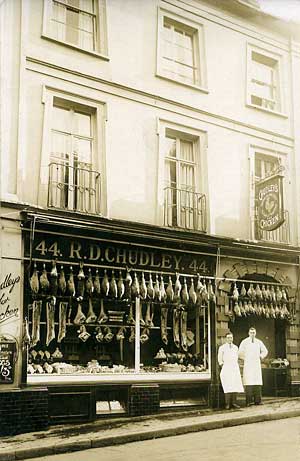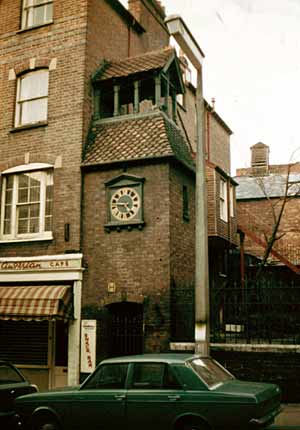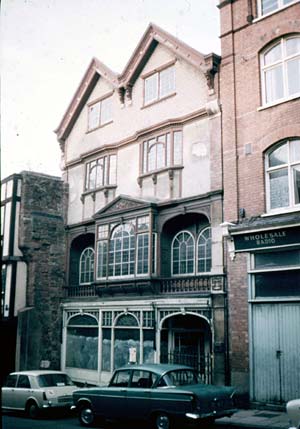
Exeter Stories
Exeter folk and friends in their own words - 1890's to the 1990's │ << Previous story │ Next story >> │
Mr Fred Lendon - memories of North Street
West side
Going down North Street from there was Morrish's meat shop. He was a nice character; lovely bit of meat down there. That changed hands several times, the shop. It were a barber shop then it went to a stationery shop, then it went back to a barber shop. Then I've got down as far as Chudley's Pork Butchers. There was a place now. Boys like myself would go in there and ask for two pennyworth of skin and bone. And it was marvellous what our mothers used to make of that skin and bone, marvellous. He always had the skin and bone for the poor people of the district. It used to make such wonderful meals.
Then going on from there was St. Kerrian's Cafe. The old clock up above there I've been up and seen that work many a time. Now there was a finery that never should have been destroyed to my mind. Some thing out of the ordinary. The clock was in wonderful condition until they started banging it around. If they'd kept it in its natural state it would have been alright now. They say they took the clock down and stored it somewhere. I've never known where it went, but it was a wonderful time piece, everybody around there used to go by it.
Then going on from there was Southwoods, typewriting people. Any manner of typewriter you mind to mention they had in there. Quite a staff worked in there at that time. I remember the manager now, a Mr. Pitts, wonderful chap provided you weren't cheeky to them.
They all seemed nice fellows in they days, if you were cheeky to them they wouldn't have nothing to do with you.
Then next door to that was Mansfields, the furniture place and it was a beautiful bit of furniture you could buy in there, very very polished. Next to that was another pub, the Elephant. During any school holiday when I wasn't working for Mr. Wilcox I used to go down the Elephant and unhook the horses from the ponies and traps when the farmers arrived. Not just farmers; people coming in to buy boots and shoes for the children.
Charlie Ross
From there was Charlie Ross's place, the Cadet Battalion. Charlie Ross was the most brilliant character Exeter ever had. Now he had a big Tailor's shop up High Street where Austin Reed is now, he used to keep quite a few tailors in there. He was, no doubt about it, a man that liked to see the youth of Exeter being useful. He opened a cadet battalion. He supplied all the clothes, all the hats, all the boots, and he made quite a nice job of it. I myself was one of his soldiers, quite a soldier. We used to go there twice a week. There was games like three--quarter billiards, darts, skittles - I don't mean the skittles like now - and we had quite social evenings down there.
Now he liked every man, every boy as he called it, to go to camp. And I went four times as far as I can remember. The last time I went was to a place called Manaton on Dartmoor. And I can see him now, six o'clock in the morning, in his birthday suit, having a bath in cold water; cold water, six o'clock in the morning. It wasn't an ordinary bath, it was a canvas bath fixed up like a baby's cradle. And I've seen 'e come out of it pink as a pink salmon. He had lovely white hair, white moustache, white eyebrows; he looked a real picture. He spent a lot of money on the youth of Exeter and done some damn good things for 'em. He was a real gent, no doubt about it.
Next door to that were a barber's shop and 'e were a German; Treuge he was called. I've seen 'e in there cutting hair; he'd put a basin on a boy's hair and cut around. Perhaps his father would send 'im back if he hadn't cut it properly - so he cut it properly. A good barber he was too.
East side
Coming up the other side we had Hannaford's, a butcher's shop, which was there ever since I could walk. It was there right up till they decided to make this car park there. They took away a lot of Exeter's fineries. Mr. Hannaford was a real business man, stern and 'e expected every man to pull his weight. He was a good boss all the same.
Then we come to the Wilson's timber place. We used to say when we were younger -
"Go in there and set fire and you'd burn half of North Street."
You would have, no doubt about it. As it happened that thing never materialised. Next door to that was Sam Matter's Fish and Chip Shop; better fish and chips than you get today, I can tell you that. I don't know what he used to do to it. Well, he couldn't cope with it sometimes, couldn't fry fast enough. You used to get your money's worth. He were a nice chap; still living today - I only spoke to him the other day.
Then there was Steer's, the boot shop; quite a nice pair of boots you could buy in there; very good people they were too. Then we come to Chapple's Court which led up to Garden Square. Next door to that was Daw's the bakers, beautiful bread.
The actual chap who ran the place was called Pinnell. Some reason or other he sort of hibernated and went as a monk down Buckfast Abbey. Then coming from there was Seldon, the fruit merchant. They used to do a nice trade. And beside his place you used to go for the brush factory - another place if you went and set fire to, it would burn half of North Street at that time. Squire's it was called. Thousands of brushes come out of there, thousands, in my time.
Then there was Kennedy's, the milk shop next door. Very nice people they were. Then we come to Mr. Abbot the tailor, and a better suit of clothes you would never get if you could afford it. Then we come to Fishy Stevens. He used to stand there and he'd pick up a fish and wop a cheeky one right across the face. He didn't like cheek, not at all.
And from there was the firm I used to work for, Wilcox'. Quite nice people but he liked his pound of flesh, working you know. Wonderful trade he had, wonderful. I've seen potatoes and salt fish outside on the path and a dog'd come along and wee all over it. And I used to say to Mr, Wilcox,
"The dog's been here, Mr. Wilcox."
"That's alright, if they eat that they'll never die."
And he used to sell it too, that was the beauty of it. The store was always very clean, always a mass of white sawdust - wood floor covered in sawdust, spotlessly clean, And I've seen 'e brush it up in a bit of dirty weather, black weather, snowy weather. In fact I've brushed it up meself five times a day. We used to go down Webber's down Bonhay Road for the sawdust, a sawmill down there. He were a proper business man, no doubt about it.
Then we come to Fatty Morgan, a chap with a stomach on him like a pack of elephants. He wouldn't have any nonsense. You could buy any sweet you could mention in those days: bonbons, aniseed balls, things like that. But 'e wouldn't let two of you come to the counter at once, cos while 'e was talking to one the other one would be helping himself to aniseed balls, see. 'E wouldn't have that. You had to stand in a queue; that clever he was. He used to lose a few things quietly even then. A boy'd say,
"I'll have something up on that shelf, Mr. Morgan,"
While he was reaching up they was helping theirselves.
A working chilhood
When we left school Friday nights father used to bath us all in the tin bath downstairs, get the water out of an old-fashioned copper. After that he'd say,
"Extract of almonds or syrup of figs?"
We'd go out to play after; didn't make any difference, summer or winter. Next morning you was up at six o'clock. I myself had to go up the coal yard, St. David's Hill which is actually the back of Queen's Street. I used to have to go up for six pennyworth of coal with a makeshift barrow. I used to have to go up three times on Saturday morning; once for me mother and father, once for me mother's sister and once for me grandfather. 'Twas hard work. And I didn't used to get anything for that. During the week I used to have to get up at six o'clock every day. Twice a week I had to go up Hammond's, up High Street, which was a butcher's shop. I had to be up there by quarter past-six, no later. I used to go and ask for two or three pennyworth of pieces, meat pieces, bring home enough meat to last my mother all the week until Friday. My brother, he used to have to fetch the milk early; my sister had to get up and turn the organ, the mangle; the other one had the ironing to do. When I got home from school, before going to Mr. Wilcox, I had to clean seven pairs of boots, 14 shoes, every night. My sister would do the necessary, polish up the bedrooms, my brother used to clean the windows.
© 2007 Jenny Lloyd
This
memory is taken from the contributon by Mr Fred Lendon to the People Talking project that was created
by Jenny Lloyd in 1976.
The full transcript, and other People Talking memories,
is available from the West Country Studies Library or the Devon and
Exeter Institution.
 Chudleys pork butchers, North Street.
Chudleys pork butchers, North Street. St Kerrian's Cafe Clock, North Street. Photo courtesy of Alan H
Mazonowicz
St Kerrian's Cafe Clock, North Street. Photo courtesy of Alan H
Mazonowicz Mansfield's Antiques, North Street. Photo courtesy of Alan H Mazonowicz
Mansfield's Antiques, North Street. Photo courtesy of Alan H Mazonowicz
│ Top of Page │